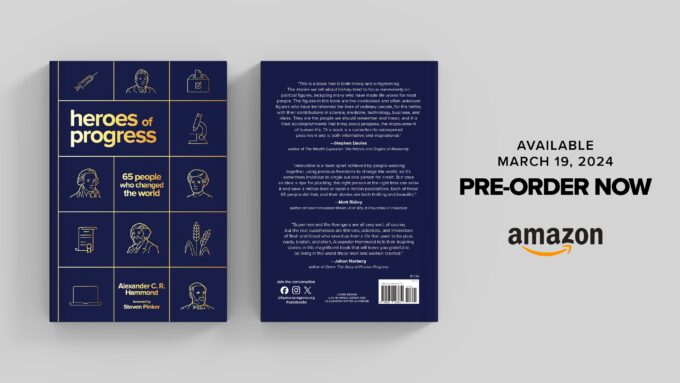Over the past two centuries, humanity has become massively more prosperous, better educated, healthier, and more peaceful.
The underlying cause of this progress is innovation. Human innovation―whether it be new ideas, inventions, or systems―is the primary way people create wealth and escape poverty.
Our upcoming book, Heroes of Progress: 65 People Who Changed the World, explores the lives of the most important innovators who have ever lived, from agronomists who saved billions from starvation and intellectuals who changed public policy for the better, to businesspeople whose innovations helped millions rise from poverty.
If it weren’t for the heroes profiled in this book, we’d all be far poorer, sicker, hungrier, and less free―if we were fortunate enough to be alive at all.
Considering their impact on humanity, perhaps it’s time to learn their story?
Heroes of Progress Book Forum
On March 21st, the author of Heroes of Progress, Alexander Hammond, will present the book live at the Cato Institute in Washington, D.C. He will be joined by Marian Tupy, the editor of Human Progress, and Clay Routledge, the Archbridge Institute’s Vice President of Research, who will speak on the individual’s role in advancing human progress and the need for a cultural progress movement.
Learn more about the event here.
Praise for Heroes of Progress
Making an inspiring case for progress at this time of skepticism and historical ingratitude is no easy feat. Yet, by relentlessly outlining the extraordinary ability of individuals to shape our world for the better, Alexander Hammond does just that.
— Steven Pinker, author of Enlightenment Now: The Case for Reason, Science, Humanism, and Progress
Innovation is a team sport achieved by people working together, using precious freedoms to change the world, so it’s sometimes invidious to single out one person for credit. But once an idea is ripe for plucking, the right person at the right time can seize it and save a million lives or open a million possibilities. Each of these 65 people did that, and their stories are both thrilling and beautiful.
— Matt Ridley, author of How Innovation Works: And Why It Flourishes in Freedom
The figures in this book are the overlooked and often unknown figures who have transformed the lives of ordinary people, for the better… This book is a correction to widespread pessimism and is both informative and inspirational.
— Dr. Stephen Davies, author of The Wealth Explosion: The Nature and Origins of Modernity
Superman and the Avengers are all very well, of course, but the real superheroes are thinkers, scientists, and innovators of flesh and blood who saved us from a life that used to be poor, nasty, brutish, and short. Alexander Hammond tells their inspiring stories in this magnificent book that will leave you grateful to be living in the world these men and women created.
— Johan Norberg, author of Open: The Story of Human Progress
The 65 innovators honored here made us happier, healthier, and longer-lived. Indeed, it is thanks to some of them that we are here at all. Their story is the story of how the human race acquired powers once attributed to gods and sorcerers―the story of how we overcame hunger, disease, ignorance, and squalor. I defy anyone to read this book and not feel better afterwards.
— Lord Daniel Hannan, president of the Institute for Free Trade
The 65 fascinating stories in Heroes of Progress are
— Lord Syed Kamall, Professor of politics and international relations, St. Mary’s University
testaments to the ingenuity of humankind in delivering a richer,
healthier, and hopefully freer world. Alexander C. R. Hammond
provides an inspirational reminder that when individuals are
free to speak, think, innovate, and engage in open markets, the
heroic potential of humanity knows no bounds.
In Heroes of Progress, Alexander Hammond reminds us that human minds are the fundamental driver of every discovery, invention, and innovation that has improved our lives. By telling the stories of pioneering men and women who have advanced civilization, this book not only honors past heroes of progress, but also provides inspiration for the next generation to use their uniquely human imaginative and enterprising capacities to build a better future.
— Clay Routledge, Vice President of Research and Director of the Human Flourishing Lab at the Archbridge Institute


